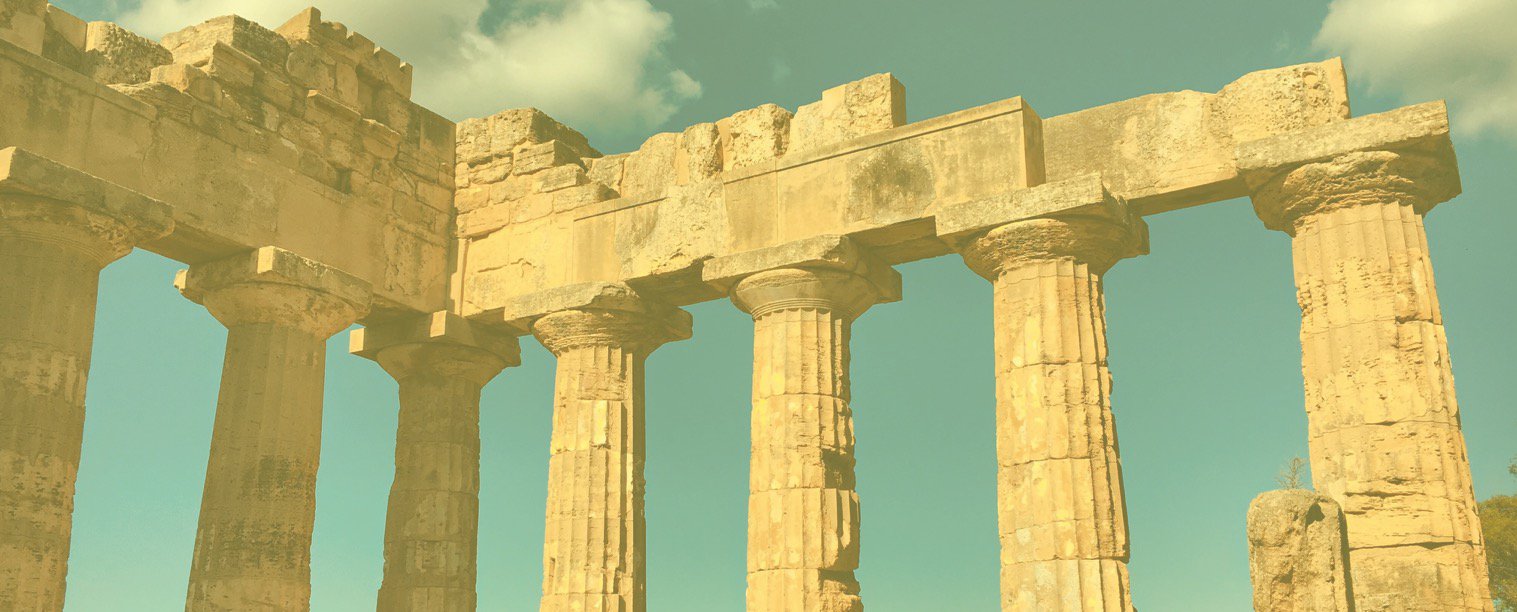
Ancient History Major
Ancient history majors embark on a voyage of discovery through the worlds of Ancient Greece and Rome, exploring the origins of these mighty civilizations, the people and events that shaped their history, and the numerous factors that ultimately combined to cause their demise. We probe the beliefs and culture of the Greek and Roman peoples, how they lived, and how they came to shape Western civilization. In a case study, we visit the ancient ruins of Pompeii and learn about daily life in this Roman town that was destroyed in a ferocious volcanic eruption almost two thousand years ago.
The complete major requirement—totaling 33 credits—is as follows. Click on the course titles for more information on credits, requirements and course contents.
History of Greece
Tap on any course to see more details.
HIS 205: Origins to Marathon (3 credits)
This course presents a chronological survey of ancient Greek history and culture beginning with the Bronze Age palace states of Crete and Mycenae, the emergence of Greek city states such as Athens and Sparta, Greek colonies, the origins of democracy, and the Persian Wars. Students learn to evaluate the diverse literary and archaeological sources of Greek history and their relationship to legend and poetry. This course meets the Bachelor of Arts degree requirements and complements other courses in ancient Mediterranean history.
Credits: 3
Bachelor of Arts: Humanities
Ancient History
General Education: Humanities
General Education Learning Objectives: effective communication, global learning, key literacies, critical and analytical thinking
HIS 306: Marathon to Alexander (3 credits)
This course presents a chronological survey of ancient Greek history and culture beginning with the aftermath of the Persian Wars, the Athenian Empire, the Peloponnesian Wars, and the eventual eclipse of Greek city states by the kingdom of Macedon. Students analyze Greek moral values, religious beliefs, and the impact these have had on Western civilization. This course meets the Bachelor of Arts degree requirements and complements other courses in ancient Mediterranean history.
Prerequisite: HIS 205
Credits: 3
Bachelor of Arts: Humanities
Ancient History
History of Rome
HIS 208: The Rise of Rome (4 credits)
History of Rome that surveys the origins of the city, the early kings, the establishment of the Republic, Roman expansion in Italy, the Punic Wars, and the rise of the Roman Empire. This course introduces students to the sources of Roman history and illustrates different approaches used by historians to critically analyze said sources. This course meets the Bachelor of Arts degree requirements and complements other courses in ancient Mediterranean history.
Credits: 4
Bachelor of Arts: Humanities
Ancient History
General Education: Humanities
General Education Learning Objectives: effective communication, global learning, key literacies, critical and analytical thinking
HIS 313: The Late Roman Republic (4 credits)
This course surveys the diverse factors that led to the fall of the Roman Republic. Students are introduced to the wide array of characters involved in the breakdown of the Republic as well as their differing world views, motives, and aims. The course also analyzes the social and legal structures employed by the Romans to govern an ever more ethnically and religiously diverse population. Students consider the forces that shaped social and cultural life in the late Republic and analyze the works of the great poets, orators, and historians of the day. This course meets the Bachelor of Arts degree requirements.
Prerequisite: HIS 208
Credits: 4
Bachelor of Arts: Humanities
Ancient History
HIS 324: The Roman Empire (4 credits)
This course surveys the time period from the rise of the Caesars to the disintegration of the empire. Students analyze key factors that shaped events during these centuries, such as the imperial succession, the rise and expansion of Christianity, external enemies, and the demands of governing an enormous empire. The course also examines Roman society during this time period and considers key themes such family, the role of women, urbanization, religion, and entertainment. Rome’s profound impact on western civilization is analyzed and discussed throughout the course. Finally, students explore the disintegration of the empire and evaluate the differing reasons given by historians for the “fall” of the Roman Empire. This course meets the Bachelor of Arts degree requirements.
Prerequisite: HIS 208
Credits: 4
Bachelor of Arts: Humanities
Ancient History
Research Project
HIS 414: Daily Life in Pompeii (6 credits)
An investigation of Pompeii. The principal aim of the course is to assist in training history majors by pursuing the study of one historical topic in detail. The course analyzes how Pompeii has contributed to our understanding of the Roman Empire and daily life in ancient Italy. Students are introduced to the geological and topographical background of Pompeii and the region of Campania. We explore the city's roads, dwellings, and civic and religious buildings to further our understanding of Etruscan, Greek, Samnite, and Roman cultural contributions to the makeup of Pompeii and key events in its history. The course aims to develop students’ skills in comparative analysis as they compare the disparate experiences of Pompeii’s inhabitants (for example, slave girls and upper-class women). Students also consider the economy, industry and lives of workers in the region. Guided by eye-witness accounts, students experience the eruption of Mt. Vesuvius in 79 A.D. and the sudden destruction of Pompeii and Herculaneum. Finally, the course analyzes the afterlife of the city and its refugees. This course meets the Bachelor of Arts degree requirements.
Prerequisite: HIS 208
Credits: 6
Bachelor of Arts: Humanities
Ancient History
Senior Thesis
Three semesters, three credits per semester
Your thesis assignment is to research a subject of your choice related to ancient history and write an essay to present your findings.
spacer